, Contributing Writer


CHICAGO–Forty long years ago Minister Louis Farrakhan had a determined idea as his efforts to rebuild the work of his father, the Honorable Elijah Muhammad, was in its infancy. That idea was to establish a newspaper and fill the information void that had been left with the demise of the legendary Muhammad Speaks newspaper. Fill the void he did in spades as he established The Final Call newspaper in the basement of his home.
The paper has grown to become an important news source for Black America and an award-winning journal. The history of this effort and the men and women who made it happen were celebrated in a Final Call workshop held at the McCormick Place Convention CenterFebruary 16 as a part of Saviours’ Day 2019.
The workshop, by current editor-in-chief Richard B. Muhammad, saluted past editors and acknowledged the work of present staff. What emerged was a history of what Black people do the best, and that is achieving the impossible while vanquishing overwhelming odds demonstrating Allah’s (God’s) power.
In opening the workshop Richard Muhammad thanked Minister Farrakhan for the institution he started and the opportunity to shepherd The Final Call newspaper. The first issue of the paper was published in May 1979. “This is our Saviours’ Day 2019 workshop, The Final Call 40th Anniversary–Our Platform: Past, Present, and Future,” said Richard Muhammad.
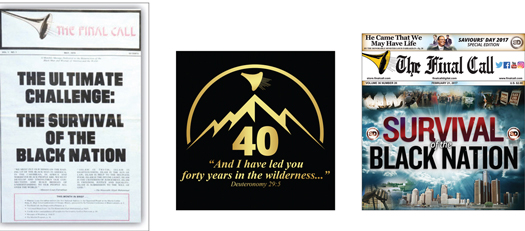
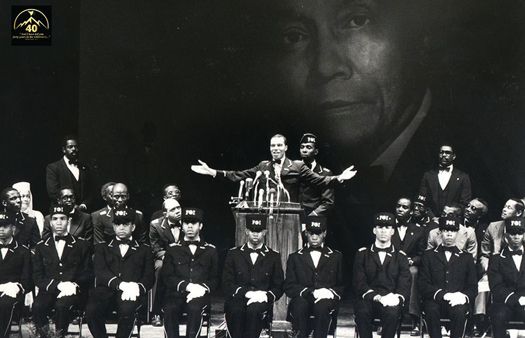
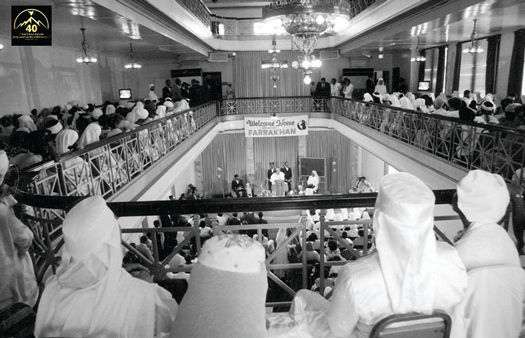
The workshop utilized audiovisual content as the presentations weaved its way down an historical path. The first visual was entitled “If there was a symbol” and chronicled how the paper was named. The graphic quoted the Honorable Elijah Muhammad and stated, “If there were any symbol that I would choose to represent me and my work it would be the trumpet.” Richard Muhammad explained the trumpet comes out of the right side of the page. “The Minister’s voice we say is the voice of truth with a brassy sound that wakes you up and inspires you and brings you forward,” he said.The workshop took great care as it acknowledged past and present contributors to the paper from the beat reporters to the production staff. A highlight was the emphasis of the paper on the development of young journalists. The editor cited Tariqah Shakir-Muhammad, a young intern for the newspaper as an example. “We have had her do all kinds of additional work for the paper,” he explained. Tariqah Shakir-Muhammad is a college student in Chicago majoring in graphic design and minoring in English. So now she is a quadruple threat. She can write, edit, take pictures and lay the paper out. We were determined we were going to invest in her, understanding that we must have a future. We have to take young people and nurture them and give them the opportunity and watch them grow,” Richard Muhammad told workshop attendees. Janiah Adams, a recent college graduate, was also on the workshop panel. She is a Final Call contributing writer and shared how writing for the publication has positively impacted her development as a journalist.
The Final Call staff are the those that Minister Farrakhan has called the unsung heroes of the Nation of Islam, said Richard Muhammad. “Our task and challenge every week is to get a little bit better and make the Minister’s job a little bit easier,” the editor noted as he moved into the heart of the program.
Upon introducing the former editors of the paper what emerged was the difficult task they encountered in molding it into the award-winning newspaper and institution it is today. “To be an editor of The Final Call is to carry a very particular and sometimes peculiar responsibility,” Richard Muhammad noted. “It is not an easy task; it is an awesome task.”
First to be introduced was James G. Muhammad who Richard Muhammad referred to as his mentor and “main man” who remains involved with the paper as its contributing editor.
James Muhammad stated he always wanted to be a journalist. “Little did I know I would wind up with the greatest paper ever produced for Black people,” he said. Sharing his historical reflections, he stated he began his work with paper while living in Cincinnati, Ohio. “I was doing a little bit of everything when I first started working for the paper and assisting the editor Abdul Wali Muhammad. I was writing, taking photos and doing layout. What he needed help in the most was layout,” James Muhammad shared, speaking about the late editor who passed away in 1991 at age 37.
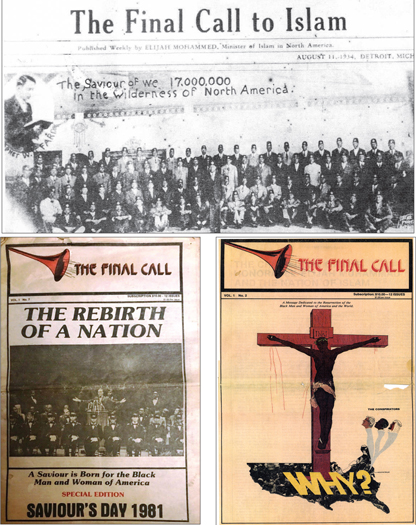
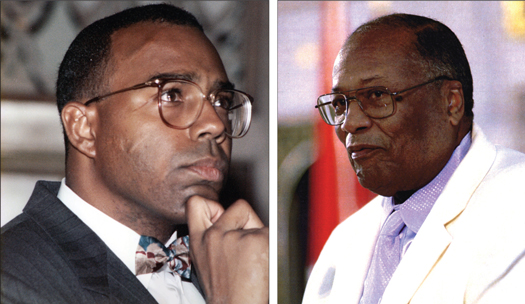
During his remarks, James Muhammad reflected on an early 1980’s visit to the Minister’s house to pick up the paper. While standing in the living room, Mother Khadijah Farrakhan, his wife, came in and stated, “they won’t help my husband.’ I felt crushed and motivated,” said James Muhammad.“On the weekends I would come to Chicago, and we would put the paper together. When we finally moved into The Final Call building, we would have raucous nights you would have thought we were drinking,” James Muhammad said fondly. “Sometimes we would spend all night there putting the paper together.”
In talking about the stress of the job as a Final Call editor, he noted that you do not want to disappoint the Minister. “For me working for The Final Call newspaper has been the pinnacle of my career.”
As the workshop transitioned an excellent video presentation was shown with violin music being played by a teenage Louis Farrakhan (then known as Louis Wolcott) as the backdrop to an historical visual montage of The Final Call saluting former editors Askia Muhammad, Abdul Allah Muhammad, Abdul Wali Muhammad, James Muhammad, Abdul Arif Muhammad, managing editor Dora Muhammad, and current editor Richard Muhammad. In the various stages of growth and development, the publication went from whenever the paper could be published and get out, to monthly, bi-weekly to weekly.
“As we move into the next phase of the development of The Final Call as we mark 40 years of publishing, we are calling on the talent of the Nation where ever it is,” Richard Muhammad stated. With that, he introduced former editor Arif Muhammad, an attorney. Arif Muhammad also serves as the Nation’s general counsel and shared he was not a journalist by trade. “I used to work closely with Brother James reviewing the paper page-to-page for legal clearance. That’s how I became familiar with how the paper functioned,” he said.
“We had a situation in 2006 with the paper that required me to step in. For anyone that has ever done this it is a herculean and mammoth job to produce a 40-page paper for resurrection,” he noted. “One day the Minister said we are really forecasters. We already have the news in advance,” said Arif Muhammad.
“It was a privilege for me, but I came in looking for my replacement. In the early days, the Minister was literally writing the paper himself. He laid the groundwork and foundation for what The Final Call would become.”
In providing an antidote Arif Muhammad told the story of an incident when the secretary of a famous comedian sued the paper over a mistake in the publication. “It happens,” Arif Muhammad said. “I will never forget our fight in this case. What killed the case for us was when he took the witness stand. Our defense was yes it was a mistake, but it didn’t have such a significant impact as is being alleged. After being called to the witness stand, the comedian said, if it was in The Final Call anybody reading it would think it was the truth because The Final Call is a paper that contains only the truth.”
Legendary former editor and current Final Call senior editor Askia Muhammad was introduced at the conclusion of remarks made by what Arif Muhammad affectionately refers to as, “the Editor’s Club.”
Askia Muhammad who holds the distinction of being the first registered Muslim to become editor of the legendary Muhammad Speaks newspaper spoke about the steep road Black journalists have to take and the lack of opportunity for them. He acknowledged the Johnson Publishing Company and the contributions they made. In referencing the Muhammad Speaks, he said the Honorable Elijah Muhammad used to tell his followers the paper was his number one minister.
Mr. Muhammad said it reaches more people than all the speakers do from the rostrum, shared Askia Muhammad. “This is also true of Minister Farrakhan and The Final Call as the Minister is congruent with his teacher. What impresses the people is you and I,” he observed.
During his presentation, Askia Muhammad stated that Black people don’t often rise in the ranks of journalism. “There is no glass ceiling but a steel door,” he said. “They don’t want the real word to get out.”
“What I find is there are few Muslims in journalism, and this demonstrates the great opportunity afforded at The Final Call,” said the longtime award-winning journalist.
In reference to the paper, he noted early on Godfrey X was the editor. At the time the paper was being published out of the Minister’s home. Askia Muhammad pointed out how Minister Farrakhan started with nothing. Due to extenuating circumstances, he left the paper for a time.
“The Minister invited me to go on the World Friendship Tour with him where we visited 50 countries and six continents. He invited me back to be a writer for the paper, and I have been writing for it ever since,” he concluded.
The workshop presentations concluded with brief remarks by Abdul Akbar Muhammad, international representative for Min. Farrakhan and the Nation of Islam. Akbar Muhammad is also an award-winning Final Call columnist.
Medals and certificates were presented to former editors and current staff and contributors.
Attending the workshop from Washington, D.C. was Demi Sanya who said the presentations were “amazing.” “Just getting the history from all of the amazing editors we have had. The history of the Nation of Islam is a key part of knowing. To hear these stories and see some of the editors this was a great program, sir. I am honored and thank Allah for being here,” he concluded.
Editor Richard B. Muhammad shared the 40-year anniversary commemoration of The Final Call will be observed through February 2020 with various activities and events to celebrate an institution that continues to be a beacon of light, truth and resurrection to the Black community and world. For more information on what’s in store for the 40th anniversary and for more exclusive content text FINALCALL to 22828.












